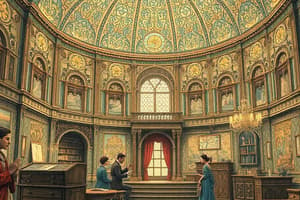Podcast
Questions and Answers
What subjects were primarily studied during the dominance of scholasticism in the Middle Ages?
What subjects were primarily studied during the dominance of scholasticism in the Middle Ages?
- Astronomy, Geography, Economics
- Literature, Mathematics, History
- Law, Medicine, Theology (correct)
- Art, Music, Philosophy
Which description best defines a Renaissance man according to Castiglione's 'Book of the Courtier'?
Which description best defines a Renaissance man according to Castiglione's 'Book of the Courtier'?
- An individual focused only on military skills.
- A well-rounded individual skilled in various arts and sciences. (correct)
- A man solely trained in classical languages.
- A merchant specializing in trade and commerce.
How did humanists view the scholastics during the Renaissance?
How did humanists view the scholastics during the Renaissance?
- As irrelevant and outdated. (correct)
- As important to the advancement of education.
- As a model for their studies.
- As allies in rediscovery of classical knowledge.
What was a significant theme in Renaissance literature and poetry?
What was a significant theme in Renaissance literature and poetry?
What was Leonardo da Vinci known for during the Renaissance?
What was Leonardo da Vinci known for during the Renaissance?
What does Giovanni Pico della Mirandola argue in 'Oration on the Dignity of Man'?
What does Giovanni Pico della Mirandola argue in 'Oration on the Dignity of Man'?
In what way were women's roles viewed in Renaissance courts compared to the Medieval period?
In what way were women's roles viewed in Renaissance courts compared to the Medieval period?
Which of the following best describes the humanists' approach to classical works?
Which of the following best describes the humanists' approach to classical works?
Flashcards
The Renaissance
The Renaissance
A period of renewed interest in classical art, literature, and philosophy that followed the Middle Ages.
Scholasticism
Scholasticism
A system of learning that emphasized logic, reason, and the authority of ancient Greek philosophers, particularly Aristotle, to understand the world.
Renaissance Man
Renaissance Man
A person who excelled in multiple fields of knowledge and skill, embodying the ideals of the Renaissance. This individual was well-versed in the arts, sciences, and humanities, and was seen as a model of human potential.
Individualism
Individualism
Signup and view all the flashcards
Scholastic theology
Scholastic theology
Signup and view all the flashcards
The Ideal Renaissance Courtier
The Ideal Renaissance Courtier
Signup and view all the flashcards
The Renaissance - Key Features
The Renaissance - Key Features
Signup and view all the flashcards
The Role of Women in the Renaissance
The Role of Women in the Renaissance
Signup and view all the flashcards
Study Notes
Renaissance Education
- Renaissance education emphasized classical studies (grammar, rhetoric, poetry, history, and moral philosophy)
- Humanists studied Latin grammar and literature to revive the glory of the classical age (Middle Ages)
- Humanists believed a good education fostered ethical values in students
- They wanted to make humans more heroic, rational, prudent, and able to achieve moral greatness.
Renaissance Man
- Renaissance men were well-rounded individuals with diverse interests
- They were artists, scientists, inventors, philosophers, politicians, and military engineers
- Examples: Leonardo da Vinci
- Renaissance men were expected to be good at many different things
Renaissance Women
- Women had less prominent roles than men in Renaissance society
- Women's feelings and thoughts were considered less important than men's
- Some women held positions at court, but their social roles were generally subordinate to men
- Wealthier families might educate their daughters in the humanities, but very few women published their own work
- Wealthier women sometimes held leadership roles and received education in convents.
Renaissance and Religion
- Humanists incorporated classical works into Christianity
- Religious figures, like Giovanni Pico della Mirandola, debated concepts like the "dignity of man"
- The Catholic Church (RCC) remained a powerful institution in Renaissance Italy, with many bishops located there
Studying That Suits You
Use AI to generate personalized quizzes and flashcards to suit your learning preferences.




